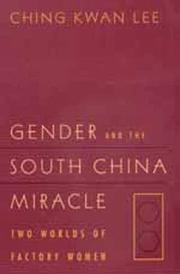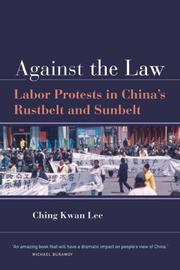| Listing 1 - 6 of 6 |
Sort by
|

ISBN: 0520211251 0520211278 052092004X 0585047650 9780520920040 9780585047652 Year: 1998 Publisher: Berkeley, California : University of California Press,
Abstract | Keywords | Export | Availability | Bookmark
 Loading...
Loading...Choose an application
- Reference Manager
- EndNote
- RefWorks (Direct export to RefWorks)
This study of women workers on either side of the Chinese-Hong Kong border demonstrates how two different factory cultures have emerged from profound economic change. It concludes that the differences in the gender politics of the two labour markets determine the culture of each factory.
Women --- Femmes --- Employment --- Economic conditions. --- Travail --- Conditions économiques --- Hong Kong (China) --- Shen-chen shih (China) --- Hong Kong (Chine) --- Shen-chen shih (Chine) --- S11/0730 --- S10/0330 --- S11/0830 --- China: Social sciences--Women: since 1949 --- China: Economics, industry and commerce--Employment --- China: Social sciences--Labour conditions and trade unions: since 1949 --- Labor market --- Labor & Workers' Economics --- Business & Economics --- Economic conditions --- Shenzhen Shi --- Shenzhen Shi (China) --- Conditions économiques --- Employees --- Market, Labor --- Supply and demand for labor --- Human females --- Wimmin --- Woman --- Womon --- Womyn --- Supply and demand --- 深圳市 (China) --- Shenzhen Municipality (China) --- Shen-chün shih (China) --- Shen-chen (Guangdong Sheng, China : Municipality) --- Shenzhen (Guangdong Sheng, China : Municipality) --- Females --- Human beings --- Femininity --- Markets --- Bao'an Xian (Guangdong Sheng, China) --- Shenzhen (Guangdong Sheng, China : East) --- E-books --- Shen-chen (Guangdong Sheng, China : East) --- Sham Chun Hu (China) --- Shen-chʻüan (China) --- Shiem Chun (China) --- Shumchün (China) --- Tschhimtschun (China) --- NON-CLASSIFIABLE --- China --- Hong Kong

ISBN: 9780520250970 9780520232228 0520250974 0520232224 0520940644 9786611752583 1281752584 1433708310 9780520940642 9781429478205 1429478209 9781281752581 9781433708312 Year: 2007 Publisher: Berkeley : University of California Press,
Abstract | Keywords | Export | Availability | Bookmark
 Loading...
Loading...Choose an application
- Reference Manager
- EndNote
- RefWorks (Direct export to RefWorks)
This study opens a critical perspective on the slow death of socialism and the rebirth of capitalism in the world's most dynamic and populous country. Based on remarkable fieldwork and extensive interviews in Chinese textile, apparel, machinery, and household appliance factories, Against the Law finds a rising tide of labor unrest mostly hidden from the world's attention. Providing a broad political and economic analysis of this labor struggle together with fine-grained ethnographic detail, the book portrays the Chinese working class as workers' stories unfold in bankrupt state factories and global sweatshops, in crowded dormitories and remote villages, at street protests as well as in quiet disenchantment with the corrupt officialdom and the fledgling legal system.
Working class --- Demonstrations --- Travailleurs --- Manifestations --- S11/0830 --- S10/0330 --- China: Social sciences--Labour conditions and trade unions: since 1949 --- China: Economics, industry and commerce--Employment --- Demonstrations. --- Demonstrations - China - Guangdong Sheng. --- Demonstrations - China - Liaoning Sheng. --- Working class - China - Guangdong Sheng. --- Working class - China - Liaoning Sheng. --- Working class. --- Labor & Workers' Economics --- Business & Economics --- Marches (Demonstrations) --- Political demonstrations --- Political marches --- Political rallies --- Public demonstrations --- Rallies (Demonstrations) --- Commons (Social order) --- Labor and laboring classes --- Laboring class --- Labouring class --- Working classes --- Employment --- Collective behavior --- Crowds --- Public meetings --- Riots --- Social classes --- Labor --- E-books --- Working class - China - Guangdong Sheng --- Working class - China - Liaoning Sheng --- Demonstrations - China - Guangdong Sheng --- Demonstrations - China - Liaoning Sheng --- 20th century chinese history. --- 21st century chinese history. --- asian politics. --- capitalism. --- china. --- chinese apparel. --- chinese household appliances. --- chinese labor politics. --- chinese machinery. --- chinese manufacturing. --- chinese politics. --- chinese rustbelt. --- chinese sunbelt. --- chinese textile. --- dagong. --- danwei. --- ethnography. --- factory workers. --- factory. --- global sweatshops. --- historical. --- labor politics. --- labor struggle. --- labor unrest. --- legal authoritarianism. --- legal system. --- politics. --- revolution. --- socialism. --- state socialism. --- working class.
Book
ISBN: 1108914896 1108823912 1108906648 110891053X Year: 2022 Publisher: Cambridge, England : Cambridge University Press,
Abstract | Keywords | Export | Availability | Bookmark
 Loading...
Loading...Choose an application
- Reference Manager
- EndNote
- RefWorks (Direct export to RefWorks)
How did Hong Kong transform itself from a 'shoppers' and capitalists' paradise' into a 'city of protests' at the frontline of a global anti-China backlash? CK Lee situates the post-1997 China-Hong Kong contestation in the broader context of 'global China.' Beijing deploys a bundle of power mechanisms - economic statecraft, patron-clientelism, and symbolic domination - around the world, including Hong Kong. This Chinese power project triggers a variety of countermovements from Asia to Africa, ranging from acquiescence and adaptation to appropriation and resistance. In Hong Kong, reactions against the totality of Chinese power have taken the form of eventful protests, which, over two decades, have broadened into a momentous decolonization struggle. More than an ideological conflict between a liberal capitalist democratizing city and its Communist authoritarian sovereign, the Hong Kong story, stunning and singular in its many peculiarities, offers lessons about China as a global force.
Hong Kong (China) --- China --- Relations --- Cina --- Kinë --- Cathay --- Chinese National Government --- Chung-kuo kuo min cheng fu --- Republic of China (1912-1949) --- Kuo min cheng fu (China : 1912-1949) --- Chung-hua min kuo (1912-1949) --- Kina (China) --- National Government (1912-1949) --- China (Republic : 1912-1949) --- People's Republic of China --- Chinese People's Republic --- Chung-hua jen min kung ho kuo --- Central People's Government of Communist China --- Chung yang jen min cheng fu --- Chung-hua chung yang jen min kung ho kuo --- Central Government of the People's Republic of China --- Zhonghua Renmin Gongheguo --- Zhong hua ren min gong he guo --- Kitaĭskai︠a︡ Narodnai︠a︡ Respublika --- Činská lidová republika --- RRT --- Republik Rakjat Tiongkok --- KNR --- Kytaĭsʹka Narodna Respublika --- Jumhūriyat al-Ṣīn al-Shaʻbīyah --- RRC --- Kitaĭ --- Kínai Népköztársaság --- Chūka Jinmin Kyōwakoku --- Erets Sin --- Sin --- Sāthāranarat Prachāchon Čhīn --- P.R. China --- PR China --- PRC --- P.R.C. --- Chung-kuo --- Zhongguo --- Zhonghuaminguo (1912-1949) --- Zhong guo --- Chine --- République Populaire de Chine --- República Popular China --- Catay --- VR China --- VRChina --- 中國 --- 中国 --- 中华人民共和国 --- Jhongguó --- Bu̇gu̇de Nayiramdaxu Dundadu Arad Ulus --- Bu̇gu̇de Nayiramdaqu Dumdadu Arad Ulus --- Bu̇gd Naĭramdakh Dundad Ard Uls --- BNKhAU --- БНХАУ --- Khi︠a︡tad --- Kitad --- Dumdadu Ulus --- Dumdad Uls --- Думдад Улс --- Kitajska --- China (Republic : 1949- ) --- Hong Kong Special Administrative Region (China) --- Xiang gang te bie xing zheng qu (China) --- 香港特別行政區 (China) --- Zhonghua Renmin Gongheguo Xianggang Tebie Xingzhengqu --- Chung-hua jen min kung ho kuo Hsiang-kang tʻe pieh hsing cheng chʻü --- Zhong hua ren min gong he guo Xiang gang te bie xing zheng qu --- 中華人民共和國香港特別行政區 --- HKSAR (China) --- Hsiang-kang tʻe pieh hsing cheng chʻü (China) --- Xianggang (China) --- 香港 (China) --- Xianggang Tebie Xingzhengqu (China) --- Hong Kong S.A.R. (China) --- Hong Kong --- Politics & government --- China studies --- Chinese politics and society --- Chinese history --- global studies. --- International relations.
Book
Year: 2007 Publisher: London, England : Routledge, Taylor & Francis Group,
Abstract | Keywords | Export | Availability | Bookmark
 Loading...
Loading...Choose an application
- Reference Manager
- EndNote
- RefWorks (Direct export to RefWorks)
Based on extensive field research, this book examines the lived experiences of Chinese labour in a wide range of occupations and settings, highlighting the complexity of changes and challenges taking place in the Chinese work place today.
Book
ISBN: 1501740938 9781501740930 9781501740947 1501740946 9781501740916 9781501740923 1501740911 150174092X Year: 2019 Publisher: Ithaca, NY : Cornell University Press,
Abstract | Keywords | Export | Availability | Bookmark
 Loading...
Loading...Choose an application
- Reference Manager
- EndNote
- RefWorks (Direct export to RefWorks)
In a comprehensive and theoretically novel analysis, Take Back Our Future unveils the causes, processes, and implications of the 2014 seventy-nine-day occupation movement in Hong Kong known as the Umbrella Movement. The essays presented here by a team of experts with deep local knowledge ask: how and why had a world financial center known for its free-wheeling capitalism transformed into a hotbed of mass defiance and civic disobedience?Take Back Our Future argues that the Umbrella Movement was a response to China's internal colonization strategies-political disenfranchisement, economic subsumption, and identity reengineering-in post-handover Hong Kong. The contributors outline how this historic and transformative movement formulated new cultural categories and narratives, fueled the formation and expansion of civil society organizations and networks both for and against the regime, and spurred the regime's turn to repression and structural closure of dissent. Although the Umbrella Movement was fraught with internal tensions, Take Back Our Future demonstrates that the movement politicized a whole generation of people who had no prior experience in politics, fashioned new subjects and identities, and awakened popular consciousness.
Umbrella Movement, China, 2014. --- Protest movements --- Civil disobedience --- Democracy --- Self-government --- Political science --- Equality --- Representative government and representation --- Republics --- Civil resistance --- Disobedience, Civil --- Government, Resistance to --- Social movements --- Hong Kong Protests, China, 2014 --- Umbrella Revolution, China, 2014 --- Hong Kong (China) --- Politics and government --- Umbrella Movement, China, 2014 --- S27/0602 --- S27/0607 --- Hong Kong--Politics and government: since 1945 --- Hong Kong--Opposition movements and parties --- Umbrella Movement, Hong Kong, Civil Disobedience, Popular Revolt, Chinese authoritarianism.
Book
ISBN: 0801462932 0801450241 9780801462931 9780801450242 Year: 2011 Publisher: Ithaca : ILR Press,
Abstract | Keywords | Export | Availability | Bookmark
 Loading...
Loading...Choose an application
- Reference Manager
- EndNote
- RefWorks (Direct export to RefWorks)
In the thirty years since the opening of China's economy, China's economic growth has been nothing short of phenomenal. At the same time, however, its employment relations system has undergone a gradual but fundamental transformation from stable and permanent employment with good benefits (often called the iron rice bowl), to a system characterized by highly precarious employment with no benefits for about 40 percent of the population. Similar transitions have occurred in other countries, such as Korea, although perhaps not at such a rapid pace as in China. This shift echoes the move from "breadwinning" careers to contingent employment in the postindustrial United States.In From Iron Rice Bowl to Informalization, an interdisciplinary group of authors examines the nature, causes, and consequences of informal employment in China at a time of major changes in Chinese society. This book provides a guide to the evolving dynamics among workers, unions, NGOs, employers, and the state as they deal with the new landscape of insecure employment.Contributors: Fang Cai, Chinese Academy of Social Sciences; Baohua Dong, East China University of Politics and Law; Mark W. Frazier, University of Oklahoma; Mary E. Gallagher, University of Michigan; Sarosh Kuruvilla, Cornell University; Ching Kwan Lee, UCLA; Kun-Chin Lin, King's College, London; Mingwei Liu, Rutgers, The State University of New Jersey; Albert Park, University of Oxford; Yuan Shen, Tsinghua University; Sarah Swider, Wayne State University; Lu Zhang, Temple University
Industrial relations --- Labor policy --- Labor market --- Informal sector (Economics) --- Relations industrielles --- Politique du travail --- Marché du travail --- Travail précaire --- Chine --- Marché du travail --- Travail précaire
| Listing 1 - 6 of 6 |
Sort by
|

 Search
Search Feedback
Feedback About UniCat
About UniCat  Help
Help News
News